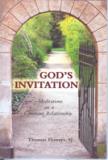Goodness in Our Midst
If you made us for yourself
You truly are a fool. If the first words of this poem do not get the reader’s attention, very little will. They are obviously words of a believer, one who acknowledges the existence of the Creator. Though definitely a believer, this poet still appears to be something of a skeptic, wondering about God’s intentions, the value of the Creator’s creation and perhaps the skill with which God creates. Nonetheless, the sentiment in the poem is reminiscent of a passage found in the Book of Isaiah. Employing the image of God as a potter, the prophet wonders if the vessel dares say of the potter: “He does not understand” (Isa 29:16).
—“Credo”
Are such words blasphemous? Was God foolish making us as we are? Or was God inept? Did the one who fashioned us misunderstand our makeup or our propensities? But who of us has not at times harbored some of these same questions? Who has not asked: Why did God make the world the way it is? Realizing that these are questions posed by believers, and devout believers at that, we can turn again to the first words of the poem and perhaps even make them our own.
The poems in God’s Invitation: Meditations on a Covenant Relationship flow from Thomas Flowers’s reflections on episodes from his own life, coupled with aspects of various biblical characters or events that somehow relate to those episodes. The 20 reflections are creatively gathered under five headings, each directly corresponding to one of the Old Testament covenants: the covenant that God initiated with creation (Gn 9:16-17); with Abraham and his descendants (Gn 17:5-7); with the Israelites at Sinai (Ex 20:5); with David and his dynasty (2 Sm 7:16); and with all those open to a new covenant (Jer 31:31-33). Flowers, a Jesuit scholastic, artfully weaves together threads that are variously colored by his own experience, vivid strands taken from biblical accounts and others that bear especially the hue of covenant theology. The poems are Flowers’s responses to the ways he sees God active in his own life. They are personal prayers that reveal aspects of his own spirituality and explain the familiarity with which he speaks to God.
Poets always reveal themselves in their poetry. Flowers’s self-revelation is twofold, in his poem-prayers and in his recollections. Though very personal, these reflections are not self-indulgent or self-promoting. Rather, they present to the reader examples of how one’s reflection on events in one’s life can illuminate the deeper meaning of biblical stories and how, comparably, reflection on biblical stories can provide insight into the religious significance of personal events. The events that he describes are quite commonplace—struggling as a teacher, working in a retirement center, enjoying the ocean. But he came to see a much deeper reality in these everyday experiences—realizing that God had accomplished much good through him, seeing the beauty of human beings in the brokenness of life, allowing the magnificence of creation to recreate him. His reflections invite the reader to ponder her or his own life in order to discover there the goodness of God, even in the midst of the ordinary.
Flowers’s observations on the biblical stories stem from his interest in them as stories. He does not analyze them as a scholar might, nor does he read into them meaning that is not already there. He lifts the characters off the biblical pages and introduces them to the reader as women and men of flesh and blood, people who struggle with the realities of life as we all do. The difference between them and us is the fact that their stories have endings, endings that we know. We, on the other hand, are still moving toward the endings of our stories. But that is precisely why Flowers has us meet them. The ending of their stories assures us that God will always be with us, as God was with them.
The personal reflections in this volume lay bare human limitations and neediness. The initial poem, with its startling beginning, and all the poems that follow reflect not on these limitations or neediness but on God’s graciousness in the face of them. Judging by human standards, one might say that it was foolish of God to make women and men who, at the slightest provocation, would fail to live up to their potential. God is not bound to human standards, however, but lavishes extraordinary blessings on weak and unreliable human beings. That is why this initial poem, after pointing out God’s graciousness, ends:
And so you are a fool, Which is, of course, Why I love you.
This article also appeared in print, under the headline “Goodness in Our Midst,” in the April 25, 2011, issue.








